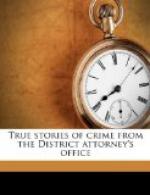John is now in prison, serving out the sentence which the court believed it necessary to inflict upon him as a warning to others. Prescott is also serving a term at hard labor—a sentence somewhat longer than John’s. The trust company took up their accounts, paid the losses of the luckless pair, and, owing to a rise in prices which came too late to benefit the latter, escaped with the comparatively trifling loss of a little over one hundred thousand dollars. At once every banking house and trust company upon the Street looked to its system of checks upon the honesty of its employees, and took precautions which should have been taken long before. The story was a nine days’ wonder. Then Union Pacific dropped twenty points more, the tide of finance closed over the heads of John and Prescott, and they were forgotten.
Had the company, instead of putting itself at the mercy of a thirty-five-dollar-a-week clerk, placed double combinations on the loan and deposit vaults, and employed two men, one to act as a check upon the other, to handle its securities, or had it merely adopted the even simpler expedient of requiring an officer of the company to be present when any securities were to be removed from the vaults, John would probably not now be in jail. It would seem that it would not be a difficult or complicated matter to employ a doorkeeper, who did not have access himself, to stand at the door of the vault and check off all securities removed therefrom or returned thereto. An officer of the bank should personally see that the loans earned up to the cage in the morning were properly returned to the vaults at night and secured with a time lock. Such a precaution would not cost the Stockholders a tenth of one per cent. in dividends.
It is a trite saying that an ounce of prevention is worth a pound of cure. But this is as true, in the case of financial institutions at least, from the point of view of the employe as of the company. It is an ingenious expedient to insure one’s self with a “fidelity corporation” against the possible defalcations of one’s servants, and doubtless certain risks can only be covered in some such fashion. These methods are eminently proper so far as they go, but they, unfortunately, do not serve the public purpose of protecting the weak from undue and unnecessary temptation. Banks and trust companies are prone to rely on the fact that most peculations are easily detected and severely punished, but the public interest demands that all business, State, municipal and private, should be so conducted that dishonesty may not only be punished, but prevented.




